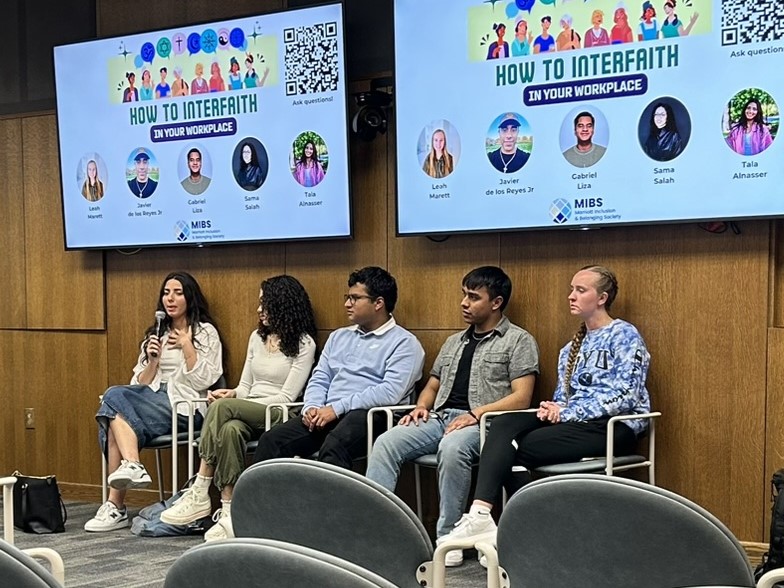
A panel of interfaith students answered various questions about how their non-Latter-day Saint faiths have affected their experiences at BYU and at work on Tuesday, March 19.
“How to Interfaith in Your Workplace,” organized by the BYU Marriott Inclusion and Belonging Society, invited five BYU students of non-Latter-day Saint faiths to share their BYU experiences, teaching attendees how to create a space of belonging at BYU and in the workplace for those of other faiths.
Fernanda Romero, a member of the Marriott Inclusion and Belonging Society, introduced the panelists and posed questions to them.
“We want to foster a belonging environment here at BYU — how we can interact with students of other faiths and how we can learn from each other,” Romero said at the beginning of the event.
Tala Alnasser is a Muslim student recently elected as the BYUSA executive vice president for the 2024-2025 academic year, making her the first non-Latter-day Saint BYUSA executive vice president, according to her. When asked why she chose to attend BYU, she expressed her admiration for BYU’s unique faith-based approach to education.
Alnasser presented an interfaith experience she had with her coworkers, explaining how they had decided to fast with her during Ramadan. In Islam, Ramadan is the holiest month of the year. Muslims fast everyday from before dawn until sunset and practice spiritual self-reflection during this month, according to Brittanica. Ramadan 2024 is currently ongoing and expected to end on April 9.
“Being able to go through Ramadan and fast every day together and watching them experience it for the first time was really empowering and really inspiring to watch,” Alnasser said. “It just really meant a lot knowing they were willing to put in the time to do something that meant a lot for us.”
Sama Salah, a Muslim student who works at the BYU Office of Belonging with Alnasser, expressed her appreciation for the everyday conversations she’s had with friends who are of different faiths.
“It’s like, ‘Wow, we all really care about our faith, and we love our faith, or we all believe in something really strongly,’” Salah said. “It’s like a mutual respect.”
Javier de los Reyes Jr., a Catholic student and vice president of the BYU Catholic Newman Club, discussed how he has felt welcomed by his Latter-day Saint peers when they have invited him to events such as Family Home Evening and ward prayer. Professors have asked him to pray in class and discuss more about his Catholic faith.
“That’s something that all of us can do, like make someone part of our group,” de los Reyes said. “It doesn’t matter what race, ethnicity, religion they are, they just feel more welcomed.”
Leah Marett, a Protestant graduate student and president of the Cross Seekers Christian Fellowship at BYU, discussed how the interfaith panel discussion “How Do You Pray?” on Oct. 19, 2023, occurred shortly after the war in the Middle East began, marking that time as potentially contentious among religious minorities at BYU.
“That’s really kind of a time that it would be honestly appropriate to say, ‘We’re going to step out of this one, and this is not a time when I want to be standing in front of an audience and sharing parts of my beliefs,'” Marett said.
Despite this concern, the entire panel still showed up to the event, Marett said.
“There are times in interfaith where we have to say we’re not going to talk about a certain topic,” Marett said. “We need to be dealing with it individually in our own faith communities. But we can still come together on a broader level and talk through things that we can share in common. In this situation, it was that all of us were praying for peace.”
When the panel was asked about any comments directed towards them that offended them, Salah mentioned a classmate of hers had once asked her if she was related to Osama Bin Laden. Salah and Alnasser have also been compared to terrorists, according to Salah.
“It’s not something that really hurts me,” Salah said. “I’m just like, ‘Why do they get to get away with that?’”
Alnasser argued one does not need to relate to someone of a different faith to understand them.
Marett mentioned how some comments from her Latter-day Saint peers have conveyed those who are members of the Church are morally superior to those of different faiths.
“Those comments, when they’re sort of directed not just as, ‘Oh, this is something we do in our tradition, and we think it’s really important,’ and it’s more like, ‘If you don’t do this, you’re less than us,’ that’s kind of offensive to me,” Marett said. “Watching my friends go through that at BYU has been really difficult.”
Gabriel Liza, a Catholic student and the treasurer of the BYU Catholic Newman Club, said BYU’s objective of studying by faith does not only apply to those of the Latter-day Saint faith. He explained a positive interfaith experience with his religion professor for Teachings and Doctrines of the Book of Mormon.
“(The professor) mentioned how similar Catholicism is with the LDS faith, and I felt like that was really supportive,” Liza said. “Ever since then, he started emphasizing similarities and how we can all learn from the same principles, and I feel like learning that at BYU has made me a better person.”
Alnasser concluded the meeting by arguing that, to understand a religion, one must immerse themselves in the religion. She has been to General Conference and various temple open houses so she can better understand the Latter-day Saint faith even if she doesn’t believe in it herself.
To find more events like this, check the websites or social media of BYU Marriott Inclusion and Belonging Society and BYU Office of Belonging.




